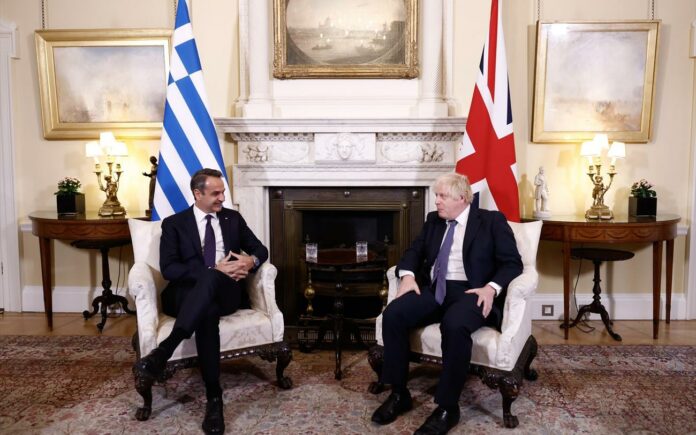Greek Prime Minister Kyriakos Mitsotakis on Sunday again appealed to his UK counterpart Boris Johnson to return the Parthenon Sculptures, urging him to “seize the moment” to bring the sculptures back home in an article published by the UK newspaper “Mail on Sunday”.
Stressing Johnson’s education in the classics, Mitsotakis said that he was uniquely placed among British prime ministers to understand the significance of the sculptures for Greece and why “one of the few dividing lines between Greece and the UK”, namely the future of the Parthenon Sculptures, needs to be resolved.
Mitsotakis repeated that the part of the Parthenon frieze currently in the British Museum, “1,500 miles from its true home” was “illegally removed by Lord Elgin” and taken from “the city and the world monument to which it rightfully belongs.” He also listed the reasons why the Acropolis Museum was the “the right place, the best place, and the only place” to fully appreciate the sculptures, stressing that “neither the frieze nor the Parthenon can be viewed as complete without the missing sculptures.”
According to Mitsotakis, there could be no greater manifestation of Johnson’s vision for a “new, self-confident, open and truly global Britain” than to repatriate the sculptures, while he stressed that Greece was prepared to allow “some of the world’s most iconic artefacts” to be displayed at the British Museum in return. He also emphasised that the demand for their return was not restricted to the Greek government but also “the unanimous view of Unesco’s Intergovernmental Commission for promoting the Return of Cultural Property to its Countries of Origin,” which had described the issue as intergovernmental and an obligation of the UK government, as well as being backed by a growing number of Britons.
Expressing Greece’s view that the sculptures are a “one-off” special case, Mitsotakis said that their return would not compel the return of other items and urged the British government to put an end to the technicality that blocked their return by modifying legal obstacles in the British Museum Act of 1963 that “tie the hands of the museum.”
“Now, given the Prime Minister has told me he would not stand in the way of Greece establishing a formal dialogue with the British Museum over the future of the marbles, I can only assume things will be different – that he will not obstruct any future agreement and, instead, the Prime Minister would seek to amend the relevant legislation to allow the sculptures’ return,” Mitsotakis added.
“One thing is certain. The ties that bind Greece and the UK go back centuries.Today, that relationship is strong, and it is enduring. But we cannot pretend that it is complete. Which is why I hope that London and Athens can work together to overturn an injustice that weighs heavy in all Greek hearts….I believe that the classical scholar in Boris Johnson knows that he has a unique opportunity to seize the moment and make this generation the one that finally reunites the Parthenon Sculptures,” Mitsotakis concluded.
Source: ANA-MPA














